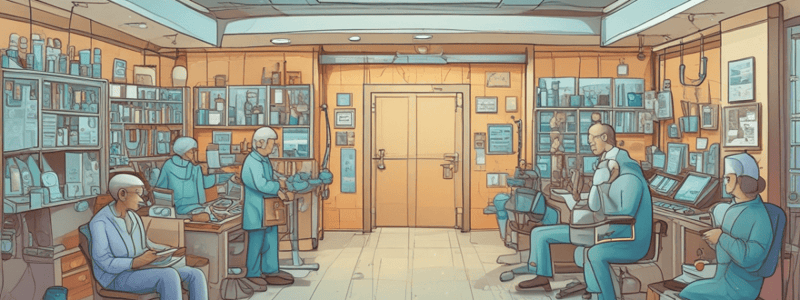Podcast
Questions and Answers
What is the definition of medical errors?
What is the definition of medical errors?
- Intended acts that may cause harm to the patient
- Unintended acts that always cause harm to the patient
- Unintended acts that may or may not cause harm to the patient (correct)
- Intended acts that always achieve their intended outcome
Which type of interventions are cost-effective in reducing the risk of ischemic heart disease and stroke?
Which type of interventions are cost-effective in reducing the risk of ischemic heart disease and stroke?
- Interventions to address medical errors
- Interventions to improve health service delivery (correct)
- Both A and B
- There is no evidence of cost-effective interventions for either
What type of analyses should be used to determine the most efficient interventions to address medical errors at the health system level?
What type of analyses should be used to determine the most efficient interventions to address medical errors at the health system level?
- Medical analyses
- Economic analyses (correct)
- Social analyses
- None of the above
Why are economic evaluations of health system improvement interventions (HSIIs) more difficult to conduct and interpret?
Why are economic evaluations of health system improvement interventions (HSIIs) more difficult to conduct and interpret?
What type of interventions are urgently needed to best serve patients and the health system?
What type of interventions are urgently needed to best serve patients and the health system?
What is the significance of interventions to improve health service delivery and increase adherence to evidence-based standards?
What is the significance of interventions to improve health service delivery and increase adherence to evidence-based standards?
What challenges can be overcome or accommodated when conducting economic analysis on HSIIs?
What challenges can be overcome or accommodated when conducting economic analysis on HSIIs?
What should be conducted to determine the cost-effectiveness of HSIIs?
What should be conducted to determine the cost-effectiveness of HSIIs?
Flashcards are hidden until you start studying
Study Notes
- Medical errors are a significant burden on the health system and are considered a problem to be addressed.
- Interventions to reduce the risk of ischemic heart disease and stroke are cost-effective, but little evidence exists for interventions to address medical errors.
- Medical errors are defined as unintended acts that may or may not cause harm to the patient but do not achieve their intended outcome.
- Economic analyses should be used to determine the most efficient interventions to address medical errors at the health system level.
- There is a significant body of evidence on the effectiveness of interventions to improve health service delivery and increase adherence to evidence-based standards.
- However, there are far fewer economic analyses of these health system improvement interventions (HSIIs) that decrease errors and improve quality.
- Economic evaluations of HSIIs can be more difficult to conduct and interpret due to their complexity as social interventions.
- Evidence-based HSIIs are urgently needed to best serve patients and the health system.
- Challenges to conducting economic analysis on HSIIs to reduce health care-associated errors and increase adherence to evidence-based standards can be overcome or accommodated.
- Empirical evaluations of HSIIs should be conducted to determine their cost-effectiveness.
Studying That Suits You
Use AI to generate personalized quizzes and flashcards to suit your learning preferences.




